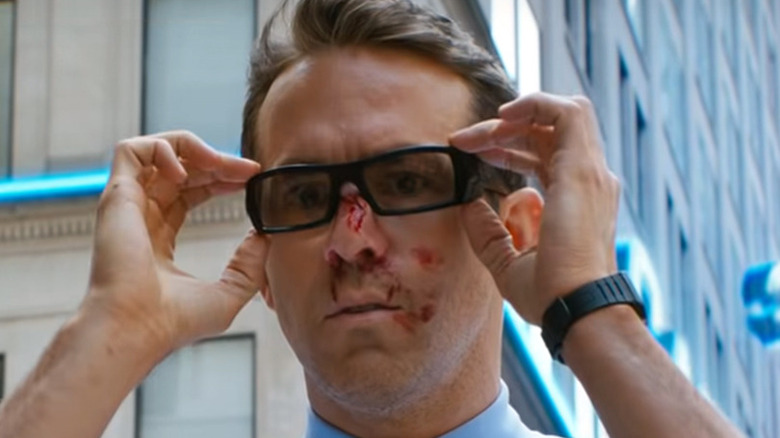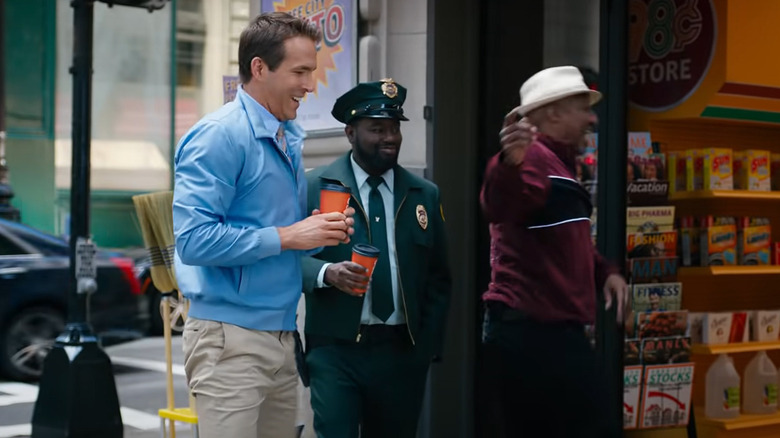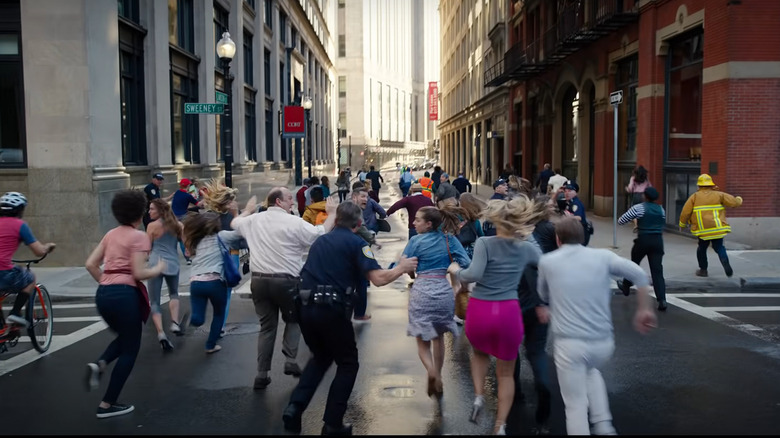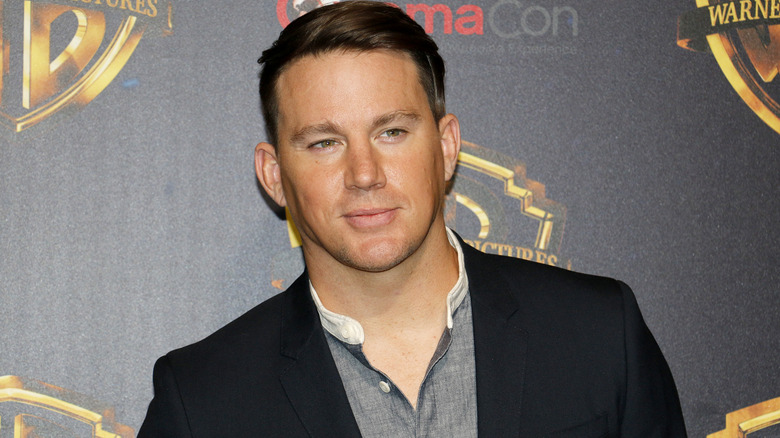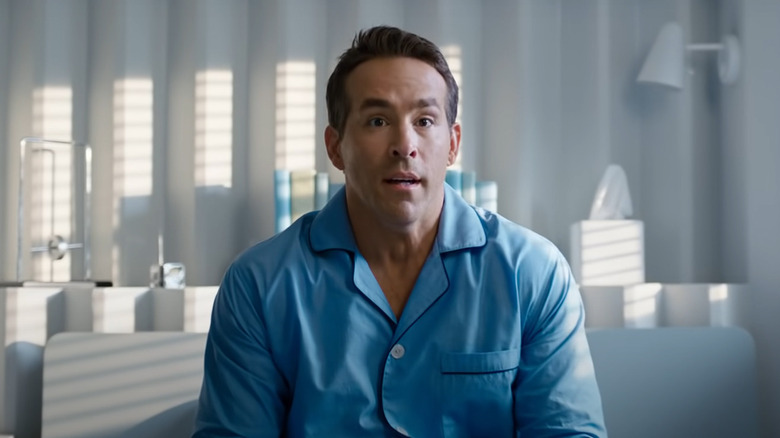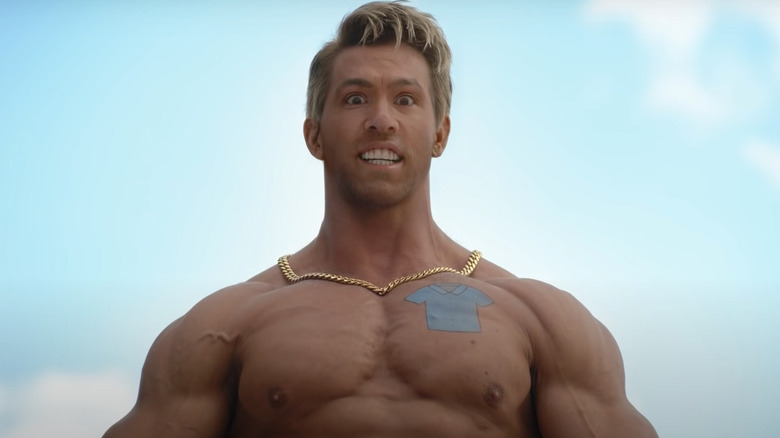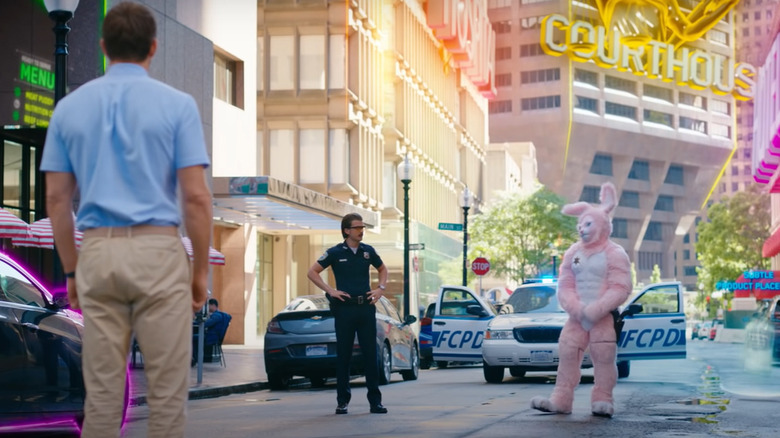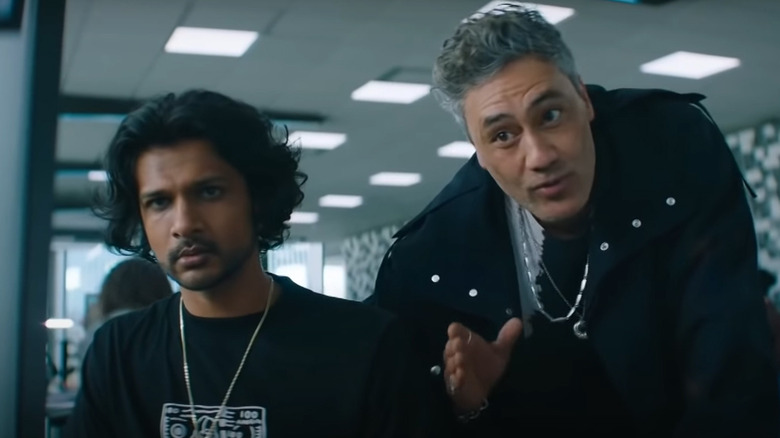Biggest Unanswered Questions In Free Guy
"Free Guy" stars Ryan Reynolds, contains big laughs, and is the movie COVID-19 bumped so many times that it became a running joke. But there might be an undercurrent of existential dread buried beneath this flick's feel-good surface.
Reynolds stars as Guy, a loveable schlub leading the blissful, routine experience of a non-player character (NPC) in a "Grand Theft Auto"-type video game. Strolling down the streets of Free City one day, he passes a captivating character named Molotov Girl who reveals the manufactured nature of his world. As he falls for Molotov Girl (and Millie, the ostracized co-inventor of the game who operates the avatar), Guy runs afoul of game publisher Antwan (Taika Waititi). Somehow, Guy has to find a way to save the day before his game is shut down forever.
Believe it or not, "Free Guy" raises more questions about free will, divine intervention, and human existence than a "Blade Runner" film. Is Guy's status as the first-ever self-aware video game character cool or creepy? If we define him as "alive," does that mean all NPCs are doomed to a harsh reality of repetition, servitude, and random violence?
Who knew a comedy about the weird world of video games could be so existential? And those lingering quandaries are only the beginning. These are the biggest unanswered questions in "Free Guy." Caution: spoilers ahead!
Do the NPCs of Free City count as robots?
Isaac Asimov's Three Laws of Robotics dictate that robots may not harm a human being, must obey orders unless they conflict with the First Law, and must protect their own existence, unless doing so conflicts with either previous Law. The NPCs of "Free City" do not have corporeal forms in our world. They do, however, have bodies in the game. They are also, undeniably, computer creations. Since your average "Free City" NPC has a body created via computer and acts on impulses directed by a computer, doesn't that make them robots?
This is an important question, because if "background" characters like the bombshell lady, the ice cream man, and the guy who can't put his arms down do not possess artificial intelligence, their actions would be severely limited. They wouldn't be able to rebel against Antwan, thereby harming their creator. They wouldn't be allowed to disobey orders, like the girl in the coffee shop does when she decides to make a cappuccino.
"Free Guy" is a breezy summer popcorn movie, so it avoids explicitly asking questions it doesn't want to answer. But if Guy is the only AI-powered NPC in Free City, the only way to explain the rebellious actions of others in the film's climax is to suppose that his artificial intelligence is somehow infectious.
How many Free City folks die?
Let's assume for a moment that the NPCs of Free City aren't robots, but living beings who simply don't understand things like life, death, and free will. If this is the case, then the film's climax, in which Antwan destroys the servers that house the game with an axe, is a tragedy on par with the destruction of Alderaan. We witness much of Free City's destruction: Buildings collapse, streets tear themselves apart, and hundreds of people flee for their lives. We are informed that Antwan destroys every server except the last one, which coincidentally houses Guy and friends we care about like Buddy (Lil Rel Howery). So, let's assume that he destroys 49 out of 50 servers, which feels like the right amount, based on the room we see. This means Antwan kills 98% of the people in Free City.
Sure, Antwan is supposed to be the film's villain. But this makes him a mass murderer who slaughters hundreds, if not thousands of people who don't even possess the mental capacity to realize their lives are ending. It really takes the character to a whole new level of evil. But hey, Guy and his funny friends live, so why should we care about that line-repeating businessman who sits on the bench outside the bank and reads the newspaper? Right? Right ...
Why does Channing Tatum sound like Channing Tatum?
In one of the film's most memorable sequences, Guy tracks down an action hero avatar who looks and sounds an awful lot like Channing Tatum. As it turns out, this character isn't interested in battling Guy so much as he just wants to goof around inside "Free City." The scene pulls back to reveal that the Tatum avatar is controlled by a dorky gamer (Matty Cardarople) sucking down snacks and begging his mom to stop interrupting.
But why does this gamer, with his nasally voice, sound like super-suave Channing Tatum inside the game? It's clear that the gamer and his Tatum avatar are saying the same words, and it also seems like the gamer is speaking into a mic that projects his voice into the game. In every open-world game we've ever played that offers players the ability to project their voice into the game's interface, it sounds like ... the player's voice. That means we should see Channing Tatum's body, but hear the gamer's voice inside "Free City."
Perhaps it seemed pointless to cast a star like Tatum and not use his voice. But we can't help but imagine a hilarious alternative to this scene. Picture this: We pull back to reveal Tatum, wearing a greasy wig and nerdy t-shirt, playing the gamer himself. It's more logical and it's hilarious.
Can Guy find love?
"I was created as a love letter to you," Guy tells Millie at the end of the film. "You need to go find the author." This is a tremendously sweet line. It's also really, really messed up. Guy is admitting that every fiber of his being was manufactured to love one person — a person forever out of reach.
Let's assume Millie regularly visits Guy via avatar. What could be more miserable than watching your soulmate grow old with someone else? Now, let's assume Millie eventually stops visiting Guy regularly. What does he do now? How can he possibly find happiness, knowing that any woman he meets is destined to fall short? By creating Guy as a love letter, Keys doomed his creation to a life of loneliness. Sure, Guy looks happy at the end of the film, but if there's a "Free Guy" sequel, the character's damning mixture of self-awareness and unfulfillable romantic expectations are likely to plunge him into a deep depression.
Perhaps in a sequel, Millie and Keys could build a second AI-powered character who looks, acts, and sounds exactly like Millie, allowing Guy to finally find love. But now we're getting into Alfred Hitchcock "Vertigo" territory. Anyway, "Free Guy" filmmakers, if you use that idea, be sure to send us the royalty checks.
How does Guy recognize his pop culture weapons?
In what is undoubtedly the most crowd-pleasing moment of the film, Guy turns around a violent smackdown from the newly-uploaded, half-finished Dude by selecting various weapons added to his repertoire. Among other iconic items, we see Captain America's shield, Hulk's arm, a lightsaber, and a "Fortnite" weapon.
If you go by his facial expressions, Guy recognizes these weapons. He also knows how to use them. But how could Guy know what "Star Wars," "Fortnite," and the MCU are? And if he's so pop-culturally aware, why doesn't he recognize his own story's resemblances to "They Live" and "The Lego Movie"? Maybe Guy sees his Hulk fist and simply thinks, "Hey, giant fist. Cool!" But it seems pretty clear that he's enjoying the connotations of his weapons as much as their functionality.
Throughout the film, we never see any indication that Guy plays video games or watches anything other than the daily news report on Free City's inevitable chaos and destruction. It also seems doubtful that anybody would have spoken to him about these properties, since his peers are equally-clueless NPCs or outsiders who aren't in the habit of chit-chatting with Guy before he becomes a household name. Is there a chance Guy simply figures out each weapon on the fly? Perhaps. But after the smoke clears on this fan-favorite scene, it leaves the viewer as confused as Chris Evans, looking on via his cell phone.
Are Keys and Millie from Boston?
"Free Guy" is set in two locations: The virtual Free City, and the non-virtual, unnamed city where Antwan's company is headquartered. So, why do they both look like Boston? The word "Boston" is never uttered in the movie, and we never see a Dunkin' Donuts, Sox cap, Duck Boat, or anybody with the slightest accent. But we do see the Financial District, the city's distinctive waterfront, the Boston Harbor Hotel, and other instantly-recognizable locales inside the game.
Is the game called "Free City: Boston"? Nope. Is it exactly mapped to Boston? Nope. But there's enough Boston-specific stuff present to make things confusing. Video games typically either recreate a famous city and use that as a selling point, or construct something wholly original. This does neither. Perhaps Millie and Keys are Bostonians who modeled "Free City" after their own environment. But it's not like Guy and Molotov Girl take the T to get bubblegum ice cream. Everything is referred to in extremely generic terms, despite the landscape's specificity.
Of course, "Free Guy" was shot in and around Massachusetts, with lots of important scenes filmed in Beantown proper. But since the locations are unnamed and no attempt is made to acknowledge Boston's people, culture, or eccentricities, the audience is left wondering why the creators of "Free City" bothered to model their entire game off the Hub.
Is Mouser the star of the movie?
The next time you watch "Free Guy," keep an eye on Mouser (Utkarsh Ambudkar). As his nickname implies, he's a sneaky guy — and he might also be the Machiavelli behind this entire film.
Which one was Mouser, you ask? He's Keys' programmer buddy, ostensibly stuck listening to him talk about his love life. He's also forced to execute Antwan's evil orders. Finally, he assists Millie on the sly, without any apparent motivation to do so. This seemingly unimportant character constantly dispenses advice which Millie, Keys, and Antwan unfailingly act upon. He shuts down the game, interferes with the game, and adds new elements to the game, many of which are unsuccessful. But what if he isn't failing in these moments? What if, instead, he's manipulating everyone to his own advantage? Look back, and you'll realize that if a single character ignored one of Mouser's pieces of information and/or advice, the entire film would have played out differently. But he's so good at pulling strings that all three characters think he's operating on their behalf.
What's his angle? Well, Mouser leans towards Antwan for much of the film, figuring the odds are in the billionaire's favor. But when the balance of power shifts, Mouser becomes a good guy and lands a sweet gig on Millie and Keys' next project. It's an intriguing subtext for a movie about avatars manipulated by distant geeks. Mouser might just be the geek driving the entire film.
